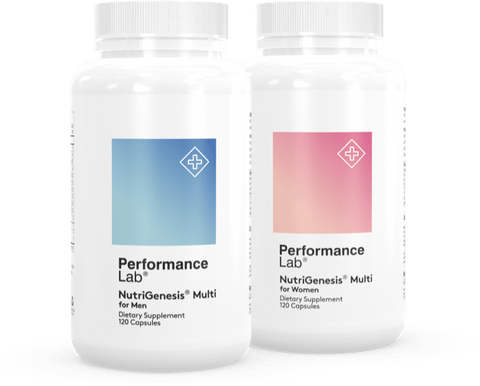If there’s one mineral that consistently takes the award for MVP, it’s magnesium. You may have heard about magnesium for sleep or muscle cramps, but there are plenty of other ways it contributes to health and performance.
Serving as a cofactor in more than 300 enzymatic reactions, especially for those involved in ATP production, low magnesium isn’t a territory you want to tread into.
Whether it’s supporting sleep, enhancing muscle health and function, or regulating glucose metabolism, there’s a long list of jobs for magnesium, so let’s get to it.
This article covers why a magnesium supplement is essential, what to look for with a deficiency, where to find it, and the best magnesium supplements.
Key Takeaways
- Magnesium is a cofactor in hundreds of enzymatic reactions, supporting ATP production, muscle and nerve function, heart health, and more—yet many adults fall short on daily intake.
- Because symptoms of low magnesium can be subtle, issues like fatigue, cramps, mood changes, arrhythmias, and poor recovery often go unlinked to underlying deficiency.
- The article outlines eight major benefits of optimal magnesium status, including better sleep, improved exercise performance, stronger bones, PMS relief, headache support, lower inflammation, cardiovascular health, and blood sugar regulation.
- It also reviews top magnesium-rich supplement options and explains how combining the right formula with lifestyle and dietary strategies can restore levels more effectively.

What Is Magnesium And What Does It Do?
Magnesium is an essential mineral found in every cell in the body required for optimal cell performance. Roughly 60% of magnesium is located within the bone, with the remaining 40% dispersed through muscles, soft tissues, and body fluids like blood 1.
It’s recognized as a cofactor for more than 300 enzymatic reactions, specifically for producing the body’s primary energy source, adenosine triphosphate (ATP) 2.
There are various forms of magnesium, such as magnesium citrate, magnesium glycinate, magnesium oxide, and magnesium sulfate, each with unique benefits and bioavailability.
Magnesium has a vital physiological role in the brain, heart, and skeletal muscles, and supplementation has proven beneficial for many conditions, including preeclampsia, migraine, depression, coronary artery disease, and asthma.
Of the functions magnesium is involved in, perhaps its most notable one is serving as a calcium antagonist, which counteracts calcium’s action on muscles to support proper contraction and relaxation.
On top of that, it’s also required for blood pressure regulation, insulin metabolism, cardiac excitability (heart rhythm), vasomotor tone, nerve transmission, and more.
But apart from the sheer number of roles magnesium plays, what’s more staggering is that more than 50% of the adult U.S. population doesn’t consume enough magnesium 3.
While deficiency signs and symptoms aren’t as apparent as they are with some other nutrients, there are specific tests that can define levels.
Magnesium Deficiency: Signs And Symptoms
Low magnesium levels often go undiagnosed, as the signs and symptoms of a magnesium deficiency are rather general. Red blood cell magnesium levels are the most accurate representation of magnesium status.
Low serum levels lead to magnesium being pulled from cells to maintain levels within a normal range 3. Because of this, a magnesium blood test may show normal levels, while an RBC test may show a deficiency.
Unlike fat-soluble vitamins stored in the body, most minerals need to be replaced daily to prevent deficiency---and taking magnesium supplements are the easiest way to ensure you’re meeting requirements even with dietary restrictions.
In any case, some signs and symptoms of a severe magnesium deficiency are:
-
Muscle weakness
-
Tremors
-
Muscle twitching
-
Arrhythmias
-
Depression
-
Agitation or irritability
-
Psychosis
-
Numbness or tingling
-
Seizures
-
Low calcium or potassium
Some of the most common reasons for hypomagnesemia include 4:
-
Decreased dietary intake
-
GI malabsorption and/or loss
-
Increased renal loss (defects or dug-induced)
-
Hyperaldosteronism
-
Diabetes
-
Hyperparathyroidism
-
Stress
-
Excessive alcohol consumption
-
Lactation
-
Prolonged exercise (especially in the heat)
8 Benefits Of Magnesium
1. Support better exercise performance
If you’re engaging in strenuous activity, chances are you need more magnesium than the average person. On top of being involved in energy metabolism, magnesium is also required to enhance glucose availability to the brain and muscles and reduce lactate accumulation to prevent fatigue 5.
Magnesium malate is particularly effective in targeting muscle cramps, pain, and fatigue, helping the body produce more energy and recover faster after workouts.
While people with a pre-existing magnesium deficiency may find greater benefits, studies show that a magnesium supplement can support greater muscle mass and power and protect against specific markers of muscle damage 6, 7.
2. Improve sleep
Sleep improvement is one of the most well-known benefits of magnesium, which results from the mineral’s ability to regulate specific neurotransmitters involved in regulating sleep, such as gamma aminobutyric acid (GABA) 8.
Magnesium glycinate, with its high bioavailability, is particularly effective in promoting relaxation and improving sleep quality.
Studies find magnesium supplements can help reduce sleep onset and improve sleep quality and duration 9, 10. But its ability to relax muscles may also be beneficial for nighttime leg cramps.
3. Boost bone health
Calcium and vitamin D have been the go-to power duo for bone health, but without sufficient magnesium, bone integrity can become compromised.
Low magnesium levels have been linked to an increased risk of osteoporosis; magnesium acts directly on crystal formation and bone cells and indirectly by altering the secretion and activity of parathyroid hormone and triggering low-grade inflammation 11.
4. Reduce PMS symptoms
If you’re dreading that time of the month because you struggle with intense cramps, irritability, bloating, and fatigue, you might want to get some magnesium.
Fluctuating magnesium levels throughout a woman’s menstrual cycle can worsen PMS symptoms in those who already have a deficiency. And increasing magnesium levels could help symptoms like bloating, mood swings, and anxiety 12, 13.
5. Relieve headaches and migraines
Low magnesium levels could contribute if you struggle with frequent headaches and migraines. It’s suggested that people who experience migraines are deficient in magnesium, and supplementation could be a well-tolerated, safe and inexpensive option for treating and preventing migraines. Magnesium oxide is often used to prevent migraines and is known for its effectiveness in treating indigestion, heartburn, and constipation. It may also be effective for tension-type headaches and cluster headaches 14, 15.
6. Decrease inflammation
Inflammation is a double-edged sword. Acute inflammation benefits the body by enhancing the body’s ability to adapt, but chronic inflammation is a key driver of aging and disease 16, 17.
Low magnesium levels have been linked to higher inflammation and oxidative stress levels. Restoring levels through supplementation may decrease C-reactive protein levels (CRP), a marker of inflammation 18.
7. Improve heart health
Magnesium has an important role in cardiovascular health, as it modulates several factors involved in maintaining the proper function of the vascular system 19.
Magnesium is also effective in lowering blood pressure by relaxing blood vessels and improving fluid and electrolyte balance.
Studies show that people with a higher magnesium intake have a lower risk of heart disease, stroke, and high blood pressure but also improved risk factors for heart disease, such as triglycerides, LDL, and HDL cholesterol 20, 21.
Having a good magnesium supplement also has benefit for regulating blood pressure and may help to lower blood pressure.
8. Regulate blood sugar levels
Blood sugar imbalances significantly contribute to the development of chronic diseases like diabetes, weight gain, and obesity. And while lifestyle choices are important for preventing disease, nutrient deficiencies are too.
Magnesium plays a crucial role in blood sugar control by improving insulin sensitivity and regulating blood sugar levels, which is beneficial for people with type 2 diabetes and metabolic syndrome.
Low magnesium levels impair the body’s ability to regulate blood sugar effectively. Studies find that higher magnesium intake is associated with a lower risk of diabetes and better insulin sensitivity 22-24.
How Much Magnesium Do You Need?
Because magnesium isn’t a trace mineral, daily requirements are pretty substantial, which is probably why most people aren’t consuming enough.
But how much do you need to maintain normal levels? The Institute of Medicine recommends between 310–360 mg for adult women and 400–420 mg for adult men 4.
Other recommendations suggest a lower intake is required—a minimum intake of 350 mg for men and 280–300 mg magnesium for women, except during pregnancy and lactation when requirements increase to a minimum of 355 mg.
Where To Find Magnesium
Whether you’re a vegan or a meat-eater, you’re in luck for places to find magnesium—this crucial mineral is abundant in plant and animal foods.
Surprisingly, drinking water accounts for roughly 10% of daily magnesium intake, while the rest can be consumed through nutrition or high-quality supplements 25. Magnesium can also be consumed through a dietary supplement, which may include other beneficial minerals like zinc and trace minerals from oyster meat extract.
Chlorophyll is a significant source of magnesium, so any leafy greens or green vegetables make it onto the list of magnesium-rich foods—spinach, mustard greens, collard greens, kale, arugula, alfalfa, parsley, broccoli, asparagus, and more. If you weren’t a fan of green veggies, learn to love them to get your fill of magnesium.
It’s also widely available in plenty of other foods. Here are the top foods to ensure adequate magnesium intake 26:
-
Lentils
-
Peanuts
-
Soybeans
-
Black beans
-
Edamame
-
Almonds
-
Cashews
-
Flaxseed
-
Pumpkin seeds
-
Quinoa
-
Unprocessed cereal grains
-
Dark chocolate
But if you’re looking to guarantee sufficient intake, supplementation is the way to go—and this magnesium-rich trio offers more than just a nutrient-store top-up. When choosing dietary supplements, it is important to consider the bioavailability and quality of the magnesium form used, and consult with a healthcare provider for optimal dosing.
Top 3 Magnesium Products You Must Have
1. Performance Lab Sleep

Performance Lab® Sleep is about to become your new night-time best friend if you struggle to get a night of sound sleep.
Featuring natural melatonin derived from Montmorency tart cherries, tryptophan, and three types of magnesium, Sleep is a non-habit-forming sleep supplement designed to relax your body and promote a deep sleep with no groggy after-effects. One of the key ingredients, magnesium citrate, is known for its ability to promote relaxation and improve sleep quality.
It blends 100% natural, high-grade nutrients to calm nerves, soothe muscles, and ease sleep-disrupting stress.
Benefits:
-
Encourages drowsiness by supplying melatonin and signaling for serotonin
-
Soothes sleep-disruptive spasms, aches, and involuntary limb movements
-
Accelerates sleep onset by relaxing muscles and nerves
-
Enhances nightly cell renewal for revitalized next-day performance
-
Stabilizes circadian rhythm against late-night screen time and irregular sleep patterns
-
Safe, non-habit-forming sleep support—no groggy synthetic side effects
2. Performance Lab Energy

Getting through the day without sixteen cups of coffee after a poor night’s sleep can be challenging, but why rely on stimulants when you can turbocharge your energy naturally using Performance Lab® Energy.
Energy is a unique formula that targets your cells’ mitochondria to naturally supports energy generation for clean, jitter-free energy without the typical stimulant-associated crash.
Unlike most other energy supplements that mega-dose caffeine and rev your nervous system, Energy supplies a blend of MicroActive® Q10, BioPerine®,
BioPQQ®, and Bio-Enhanced® vitamin sand minerals to optimize mitochondrial function and provide a surge of natural vitality in both body and mind. With no caffeine, no crash, or additives, it’s ultra-clean energy for peak performance.
Benefits:
-
Stim-free booster promotes energy production in cells’ mitochondria
-
Helps exercise results by maintaining energy in muscle and metabolizing energy in fat
-
Enhances vitality by helping to multiply, protect, and re-charge mitochondria
-
Supports efficient metabolic performance in nearly every cell in the body
-
Safe, natural, and legal way to revitalize mental and physical performance
-
Stimulant-free energy for those who prefer to avoid or limit caffeine intake
3. Performance Lab NutriGenesis Multi

Many people assume that a good diet eliminates the need for a multivitamin. While a balanced diet should provide the essential nutrients, it doesn’t always wholly fulfill needs—that’s where a good multi comes into the picture.
Performance Lab® NutriGenesis Multi is a state-of-the-art multivitamin supplying 100% RDI of 17+ essential vitamins and minerals. Performance Lab NutriGenesis Multi includes magnesium chloride, which supports muscle and joint health and has shown potential in treating depressive symptoms.
But unlike conventional multivitamins that provide synthetic nutrient forms and improper doses, Multi uses NutriGenesis technology. This patented process mirrors natural nutrient genesis to offer bioidentical nutrients for maximum absorption and benefits.
Benefits:
-
Foundational nutritional support for healthy whole-body biological performance
-
Supports daily vitality and long-range overall health
-
Customized for men; gender-specific dosages and hormonal support
-
Complexed with absorption-enhancing cofactors; no synthetic or isolated nutrients
-
Stacks seamlessly with all other Performance Lab® formulas
References
- Gröber U, Schmidt J, Kisters K. Magnesium in Prevention and Therapy. Nutrients. 2015;7(9):8199-8226.
- de Baaij JH, Hoenderop JG, Bindels RJ. Magnesium in man: implications for health and disease. Physiol Rev. 2015;95(1):1-46.
- Razzaque MS. Magnesium: Are We Consuming Enough?. Nutrients. 2018;10(12):1863.
- Jahnen-Dechent W, Ketteler M. Magnesium basics. Clin Kidney J. 2012;5(Suppl 1):i3-i14.
- Zhang Y, Xun P, Wang R, Mao L, He K. Can Magnesium Enhance Exercise Performance?. Nutrients. 2017;9(9):946.
- Welch AA, Kelaiditi E, Jennings A, Steves CJ, Spector TD, MacGregor A. Dietary Magnesium Is Positively Associated With Skeletal Muscle Power and Indices of Muscle Mass and May Attenuate the Association Between Circulating C-Reactive Protein and Muscle Mass in Women. J Bone Miner Res. 2016;31(2):317-325.
- Córdova A, Mielgo-Ayuso J, Roche E, Caballero-García A, Fernandez-Lázaro D. Impact of Magnesium Supplementation in Muscle Damage of Professional Cyclists Competing in a Stage Race. Nutrients. 2019;11(8):1927.
- Boyle NB, Lawton C, Dye L. The Effects of Magnesium Supplementation on Subjective Anxiety and Stress-A Systematic Review. Nutrients. 2017;9(5):429.
- Mah J, Pitre T. Oral magnesium supplementation for insomnia in older adults: a Systematic Review & Meta-Analysis. BMC Complement Med Ther. 2021;21(1):125.
- Zhang Y, Chen C, Lu L, et al. Association of magnesium intake with sleep duration and sleep quality: findings from the CARDIA study. Sleep. 2022;45(4):zsab276.
- Castiglioni S, Cazzaniga A, Albisetti W, Maier JA. Magnesium and osteoporosis: current state of knowledge and future research directions. Nutrients. 2013;5(8):3022-3033.
- Tonick S, Muneyyirci-Delale O. Magnesium in women’s health and gynecology. Open Journal of Obstetrics and Gynecology. 2016;6(5):325-333.
- Ebrahimi E, Khayati Motlagh S, Nemati S, Tavakoli Z. Effects of magnesium and vitamin b6 on the severity of premenstrual syndrome symptoms. J Caring Sci. 2012;1(4):183-189.
- Chiu HY, Yeh TH, Huang YC, Chen PY. Effects of Intravenous and Oral Magnesium on Reducing Migraine: A Meta-analysis of Randomized Controlled Trials. Pain Physician. 2016;19(1):E97-E112.
- von Luckner A, Riederer F. Magnesium in Migraine Prophylaxis-Is There an Evidence-Based Rationale? A Systematic Review. Headache. 2018;58(2):199-209.
- Nielsen FH. Magnesium deficiency and increased inflammation: current perspectives. J Inflamm Res. 2018;11:25-34.
- Furman D, Campisi J, Verdin E, et al. Chronic inflammation in the etiology of disease across the life span. Nat Med. 2019;25(12):1822-1832.
- Simental-Mendia LE, Sahebkar A, Rodriguez-Moran M, Zambrano-Galvan G, Guerrero-Romero F. Effect of Magnesium Supplementation on Plasma C-reactive Protein Concentrations: A Systematic Review and Meta-Analysis of Randomized Controlled Trials. Curr Pharm Des. 2017;23(31):4678-4686.
- Tangvoraphonkchai K, Davenport A. Magnesium and Cardiovascular Disease. Adv Chronic Kidney Dis. 2018;25(3):251-260.
- Rosique-Esteban N, Guasch-Ferré M, Hernández-Alonso P, Salas-Salvadó J. Dietary Magnesium and Cardiovascular Disease: A Review with Emphasis in Epidemiological Studies. Nutrients. 2018;10(2):168.
- Verma H, Garg R. Effect of magnesium supplementation on type 2 diabetes associated cardiovascular risk factors: a systematic review and meta-analysis. J Hum Nutr Diet. 2017;30(5):621-633.
- Barbagallo M, Dominguez LJ. Magnesium and type 2 diabetes. World J Diabetes. 2015;6(10):1152-1157.
- Simental-Mendía LE, Sahebkar A, Rodríguez-Morán M, Guerrero-Romero F. A systematic review and meta-analysis of randomized controlled trials on the effects of magnesium supplementation on insulin sensitivity and glucose control. Pharmacol Res. 2016;111:272-282.
- Veronese N, Watutantrige-Fernando S, Luchini C, et al. Effect of magnesium supplementation on glucose metabolism in people with or at risk of diabetes: a systematic review and meta-analysis of double-blind randomized controlled trials (published correction appears in Eur J Clin Nutr. 2016 Dec;70(12 ):1463). Eur J Clin Nutr. 2016;70(12):1354-1359.
- Marx A, Neutra RR. Magnesium in drinking water and ischemic heart disease. Epidemiol Rev. 1997;19(2):258-272.
- Fox C, Ramsoomair D, Carter C. Magnesium: its proven and potential clinical significance. South Med J. 2001;94(12):1195-1201.













